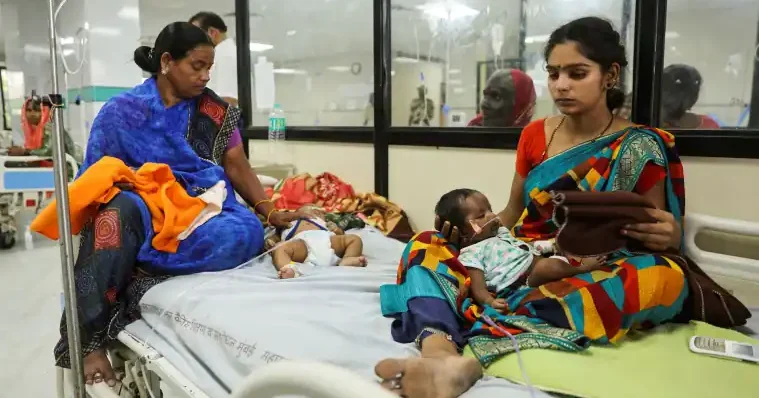Flawed medicine procurement system responsible for Nanded hospital deaths
Source: IndianExpress
The deaths of 31 patients within a two-day period at the Maharashtra government-run Dr Shankarrao Chavan Government Medical College and Hospital in Nanded has once again exposed the state’s flawed medicine procurement system as a shortage of medicines is being cited as one of the reasons for the tragedy.
A delay in implementing the recently passed Medical Goods Procurement Authority Act and the resultant change in procurement rules are to blame for the medicine shortage in the state, say sources.
In March this year, Maharashtra enacted the Medical Goods Procurement Authority Act with the aim of establishing an authority for single-point procurement and supply of certain medicines, medical goods, medical consumables, devices, equipment etc. for public hospitals and medical colleges. This was expected to do away with alleged delays in the procurement of medicines by the state-run Haffkine Bio-Pharmaceutical Corporation Limited. So far, all state government departments providing medical services have had to purchase medicines, medical equipment and other related items from Haffkine.
Maharashtra Health Minister Tanaji Sawant had said in March that establishing an independent authority would streamline and expedite the procurement and supply process for state government health institutions, ensuring easier, transparent, fair, and affordable access to medicines for people. He had also highlighted that the state government allocates over Rs 20,000 crore annually for medical purchases across all its departments, a sum that would now be centralised through the newly formed procurement authority.
However, according to sources, the implementation of the Act was delayed due to issues related to committee formation, protocol establishment etc., as a result of which, the tendering process only started five months later, in August. “Tendering began in mid-August but it typically takes 1-2 months for procurement and distribution,” a senior health officer said.
It has also come to light that due to the changes in procurement rules, even Haffkine abstained from making purchases, exacerbating the medicine shortage problem in the state.
Procurement of medicines usually begins in March each year, and by now, the institution should have secured over 50 per cent of the required stock, Abhay Pandey, chairman of the All Food and Drugs License Holders Foundation, an association of wholesale medicine suppliers, pointed out. “However, as of this month, Haffkine has only procured 10-20 per cent of the medicines. Government hospitals have been making their own procurements to address shortages,” noted Pandey.
Dr Dilip Govindrao Mhaisekar, the director of the Directorate of Medical Education and Research (DMER), was not available for comment.
To provide context, several government medical colleges had to abruptly halt their procurement from Haffkine. For example, around June-July, Haffkine refunded Rs 20 crore to the Nagpur district hospital; the amount was originally intended for the acquisition of equipment for cancer treatment and robotic surgeries.
An official from a government medical college hospital explained, “Fresh proposals will need to be submitted, and government approval for funding must be obtained anew. The procurement process will follow the new policy, bypassing the Haffkine Institute, to an expert committee led by the district collector.”
Dr Ravi Duggal, an independent health researcher and economist, has long emphasised the necessity for an independent organisation akin to Tamil Nadu’s Medical Services Corporation (TNMSC) Limited, to enhance transparency in the healthcare sector. “Just enacting a new rule will not suffice as it needs to be implemented. There is a need for more transparency where citizens can also easily access detailed information about tendering and availability,” he said, adding that annual reports of medicine shortage, especially in a medical college like Nanded District Hospital, are “shameful”.
He also highlighted how the state allocates a budget of Rs 400 crore for medical education but consistently underspends. “Every year, we hear the issue of shortages of medicines and life-saving equipment. Then, why is the fund not being used?” Dr Duggal asked.
In 2017, the state government had set up a purchase cell at Haffkine to ensure bulk purchases of medical goods at minimum rates and had made it mandatory for medical service departments to procure goods from there. Soon, grievances began cropping up about the procurement cell’s failure to make timely purchases, resulting in a delay of 1.5 to 4 years in delivering drugs and equipment to medical institutions. Rural patients bore the brunt.
“Ninety per cent of the medicine procurement was initially assigned to Haffkine, with the medical college responsible for the remaining 10 per cent through local purchases. However, due to delays, we ended up procuring 20-30 per cent of the medicines,” a government medical college dean explained.
Most medical colleges in the state complained of similar challenges. Furthermore, there have been delays from the state government in disbursing funds for purchases beyond the 10 per cent allocation, as requested by the suppliers. “This has resulted in pending bills totalling Rs 100 crore as of today. It discourages local suppliers from providing medicines to the colleges, exacerbating the supply and demand gap,” said Pandey.



